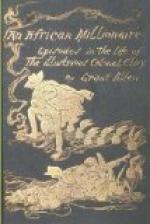“I have his coat, at least,” I said. “That may afford us a clue.” And I limped back with it in my hands, feeling horribly bruised and a good deal shaken.
When we came to examine the coat, however, it bore no maker’s name; the strap at the back, where the tailor proclaims with pride his handicraft, had been carefully ripped off, and its place was taken by a tag of plain black tape without inscription of any sort. We searched the breast-pocket. A handkerchief, similarly nameless, but of finest cambric. The side-pockets—ha, what was this? I drew a piece of paper out in triumph. It was a note—a real find—the one which the servant had handed to our friend just before at the Senator’s.
We read it through breathlessly:—
“DARLING PAUL,—I told you it was too dangerous. You should have listened to me. You ought never to have imitated any real person. I happened to glance at the hotel tape just now, to see the quotations for Cloetedorps to-day, and what do you think I read as part of the latest telegram from England? ’Mr. Algernon Coleyard, the famous poet, is lying on his death-bed at his home in Devonshire.’ By this time all New York knows. Don’t stop one minute. Say I’m dangerously ill, and come away at once. Don’t return to the hotel. I am removing our things. Meet me at Mary’s. Your devoted, MARGOT.”
“This is very important,” Charles said. “This does give us a clue. We know two things now: his real name is Paul—whatever else it may be, and Madame Picardet’s is Margot.”
I searched the pocket again, and pulled out a ring. Evidently he had thrust these two things there when he saw me pursuing him, and had forgotten or neglected them in the heat of the mêlée.
I looked at it close. It was the very ring I had noticed on his finger while he was playing Swedish poker. It had a large compound gem in the centre, set with many facets, and rising like a pyramid to a point in the middle. There were eight faces in all, some of them composed of emerald, amethyst, or turquoise. But one face—the one that turned at a direct angle towards the wearer’s eye—was not a gem at all, but an extremely tiny convex mirror. In a moment I spotted the trick. He held this hand carelessly on the table while my brother-in-law dealt; and when he saw that the suit and number of his own card mirrored in it by means of the squeezers were better than Charles’s, he had “an inspiration,” and backed his luck—or rather his knowledge—with perfect confidence. I did not doubt, either, that his odd-looking eyeglass was a powerful magnifier which helped him in the trick. Still, we tried another deal, by way of experiment—I wearing the ring; and even with the naked eye I was able to distinguish in every case the suit and pips of the card that was dealt me.
“Why, that was almost dishonest,” the Senator said, drawing back. He wished to show us that even far-Western speculators drew a line somewhere.




